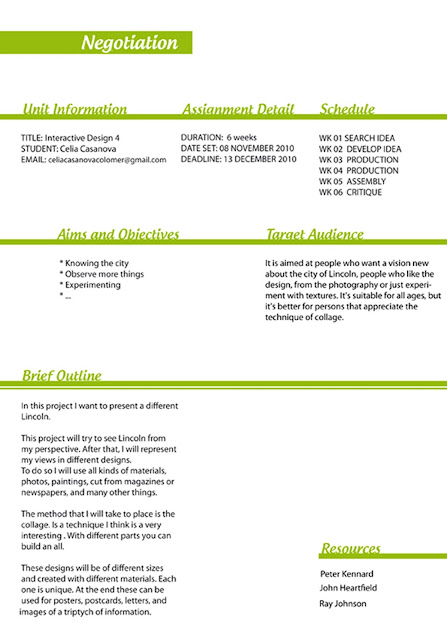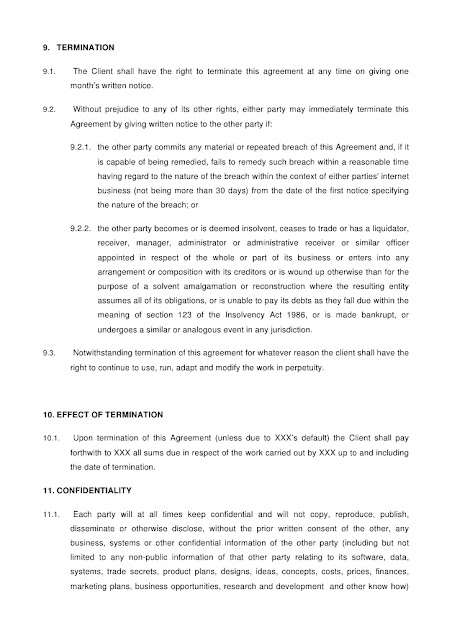Advantages of a Formal brief - There are many advantages to a formal brief, these are the kinds of advantages that would be expected in any type of formal brief, for instance, it makes it looks more professional to the readers, to convey the correct image, a formal brief will make you look professional and prepared, as if you have gone over every detail, it will also ensure payment at the end of the contract, this is because it would be written in and included, meaning that if demands are not met, legally, you or the client would be able to sue, as the legal documentation has not been met.
Despite many advantages, there are also contrasting disadvantages, these would be that it is defiantly time consuming, as it is all written down in the document, also meaning that if certain demands are not met, either way, the party who do not have their demands met will be able to take legal action as the demands have already been written down and stated through the formal brief.
Informal Brief - An Informal brief is verbal, the opposite to a formal brief, where it is all written down, an informal; brief is on the word and verbally between the two parties involved.
The advantages to an informal brief would be that it is quick and simple, meaning all of the points you need to cover can be done within a shorter time frame and then more time can be spent planning and producing what is needed, it is also very casual, allowing it to be easily understood, it also means that because the information in the brief is not set in stone, it allows certain aspects of the brief to change throughout the process.
However, there are many disadvantages to an informal brief, one major factor being that because there is no legal documentation, it means that if you do not complete the work in time, there is no way that the client or company would be able to carry out any legal action, because nothing has been signed. It can also be seemed as looking unorganized and messy, mainly unprofessional and so an informal brief is unlikely to be used in a big situation because of the risks at can have.
Competition Brief - This is a brief where a company will purposely create a competition for different companies to create something for the brief that has been set, in the end there is only one winner and therefore winner will defiantly take all with a competition brief.
The Advantages of a competition brief would be that many different ideas can be generated through, so more than one good idea can be produced and the company will be able to pick the very best one to suit their brief.
However, there are also disadvantages, the main one being that the different companies taking part in the competition brief will be competing against each other and will have to use their own money to make the project and suit the brief, meaning that the different companies take a massive risk in losing a lot of money in order to win.
Commission Brief - A commission brief is when a large company will hire another smaller company to help carry out the brief with them.
Advantages of commission brief mainly are that the smaller company will be allowed to make money and their own profit by carrying out the brief.
The Disadvantages of this type of brief is that the companies can clash over different ideas, this is because they may not agree on certain things.
Tender Brief - The Tender brief is when the brief is advertised to different clients, the final one will be submitted and decided once all has been advertised and all ideas are on the table.
Advantages for a Tender brief is that your work can still be used or sampled despite the fact that it may not even be chosen, the work may be chosen and used for a different project in the future from the same company.
There are Disadvantages to a Tender brief also, mainly being that it is very time consuming and a lot of time can be wasted, also, companies can clash as they have the same idea.
Negotiated Brief - A Negotiated Brief is when an agreement is needed, along with communication on the brief, allowing both parties to change their minds and negotiate certain specific changes to the brief. Meaning that the brief is not set in stone.
The advantages of a negotiated brief are that any issues that either the company or the client have can be resolved by negotiating any changes to the original brief, however they will not be heavy changes.
Disadvantages could be that agreements may not be made, for instance if the client doesn't agree with the company, then there could be issues needing to be resolved as neither party would be able to move forward in negotiations.
Contractual Brief - This is a brief similar to a formal brief, where it is very formal and legally binding, meaning that if rules are broken and it has been signed, it is a legal document and can't be broken.
Advantages of a contractual brief are that there are not too may complications or delays with the brief and once everything is signed and ready, it is easy to follow and the company or client are ready to begin.
A disadvantage of a contractual brief is that once it is signed, there is know negotiating to be done and if the requirements are unfulfilled, then they company or client have the right to take any kind of legal action against you.






No comments:
Post a Comment